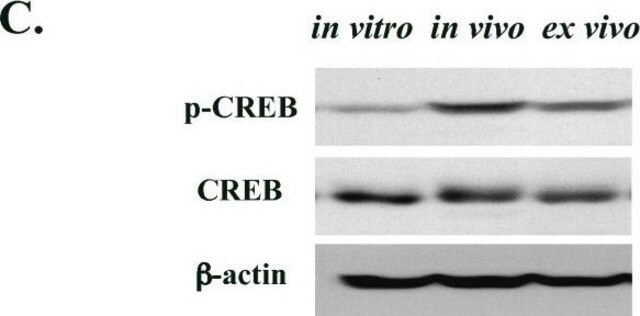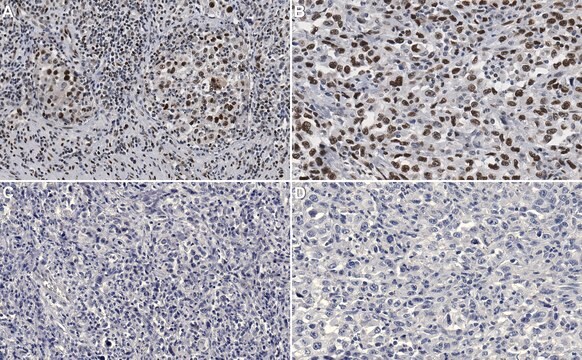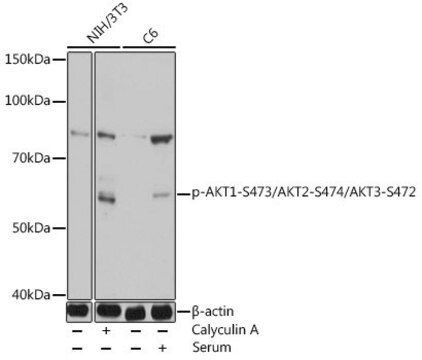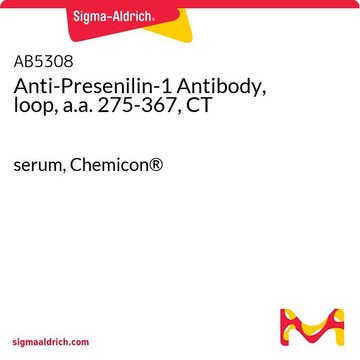AB3442
Anti-CREB Antibody, pSer133
serum, Chemicon®
Synonym(s):
CREB-1, cAMP-response Element-binding Protein-1
Sign Into View Organizational & Contract Pricing
All Photos(1)
About This Item
UNSPSC Code:
12352203
eCl@ss:
32160702
NACRES:
NA.41
Recommended Products
biological source
rabbit
Quality Level
antibody form
serum
antibody product type
primary antibodies
clone
polyclonal
species reactivity
mouse, human, monkey, rat
manufacturer/tradename
Chemicon®
technique(s)
western blot: suitable
NCBI accession no.
UniProt accession no.
shipped in
wet ice
target post-translational modification
unmodified
Gene Information
human ... CREB1(1385)
Specificity
Recognizes phosphorylated Serine133 in cAMP response element binding protein (CREB). By immunoblotting the antibody shows a 5-10 fold increase in staining of a 43 kDa protein after treatment of cells with agents that increase intracellular cAMP. The antibody also recognizes phosphorylated ATF-1 due to a common epitope. The antibody has been preabsorbed with unphosphorylated peptide and will prove to be useful for the investigation of CREB phosphorylation.
Immunogen
Epitope: pSer133
Phosphopeptide conjugated to KLH.
Application
Anti-CREB Antibody, pSer133 is a Rabbit Polyclonal Antibody for detection of CREB also known as CREB-1, cAMP-response Element-binding Protein-1 & has been validated in WB.
Immunoblotting: 1:500-1:1,000
Optimal working dilutions must be determined by the end user.
Optimal working dilutions must be determined by the end user.
Research Category
Epigenetics & Nuclear Function
Epigenetics & Nuclear Function
Research Sub Category
Transcription Factors
RNA Binding Protein (RBP)
Transcription Factors
RNA Binding Protein (RBP)
Physical form
Rabbit serum. Liquid. The antibody has been preabsorbed with unphosphorylated peptide. Contains 0.01% sodium azide.
Storage and Stability
Maintain at -20°C in undiluted aliquots for up to 12 months after date of receipt. Avoid repeated freeze-thaw cycles.
Legal Information
CHEMICON is a registered trademark of Merck KGaA, Darmstadt, Germany
Disclaimer
Unless otherwise stated in our catalog or other company documentation accompanying the product(s), our products are intended for research use only and are not to be used for any other purpose, which includes but is not limited to, unauthorized commercial uses, in vitro diagnostic uses, ex vivo or in vivo therapeutic uses or any type of consumption or application to humans or animals.
Not finding the right product?
Try our Product Selector Tool.
recommended
Product No.
Description
Pricing
Storage Class Code
10 - Combustible liquids
WGK
WGK 1
Certificates of Analysis (COA)
Search for Certificates of Analysis (COA) by entering the products Lot/Batch Number. Lot and Batch Numbers can be found on a product’s label following the words ‘Lot’ or ‘Batch’.
Already Own This Product?
Find documentation for the products that you have recently purchased in the Document Library.
De novo protein synthesis of syntaxin-1 and dynamin-1 in long-term memory formation requires CREB1 gene transcription in Lymnaea stagnalis.
Cong-Hui Guo,Anthony Senzel,Kathy Li,Zhong-Ping Feng
Behavior Genetics null
Jonathan Aryeh Sobel et al.
PLoS biology, 15(4), e2001069-e2001069 (2017-04-18)
Many organisms exhibit temporal rhythms in gene expression that propel diurnal cycles in physiology. In the liver of mammals, these rhythms are controlled by transcription-translation feedback loops of the core circadian clock and by feeding-fasting cycles. To better understand the
Our team of scientists has experience in all areas of research including Life Science, Material Science, Chemical Synthesis, Chromatography, Analytical and many others.
Contact Technical Service








